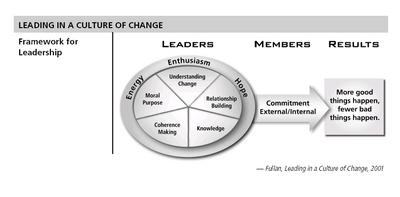 A must read from Michael Fullan
A must read from Michael Fullan Fullan presents a framework for leadership. With the complexity & relentless pace of change, leadership is key. Not the charismatic, superhuman leader which can result in episodic change but where we can all work together for sustainable change.
"...five components of leadership represent independent but mutual reinforcing forces for positive change....To be effective in complex times, leaders must be guided by moral purpose. Moral purpose means acting with the intention of making a positive difference.
Understand the change process: 1) the goal is not to innovate the most; 2) it is not enough to have the best ideas; 3) appreciate early difficulties of trying something new; 4) redefine resistance as a potential positive force; 5) reculturing is the name of the game; 6) never a checklist, always complexity...
The single factor common to every successful change initiative is that relationships improve. Thus leaders must be consummate relationship builders with diverse people and groups... effective leaders constantly foster purposeful interactions and problem solving, and are wary of easy consensus.
Knowledge creation and sharing ...leaders commit themselves to constantly generating and increasing knowledge inside and outside the organisation...turning information into knowledge is a social process. All this complexity keeps people on the edge of chaos. It is important to be on the edge because that is where creativity resides, but anarchy lurks there too. Therefore effective leaders tolerate enough ambiguity to keep the creative juices flowing, but along the way (once they and the group know enough), they seek coherence. Coherence making is a perennial pursuit."
Fullan also talks about personal characteristics that all effective leaders possess: energy - enthusiasm - hopefullness. He warns about groupthink "Leaders can be powerful, and so can groups, which means they can be powerfully wrong. This is why the five dimensions of leadership must work in concert. They provide a check against uninformed commitment."
Fullan advocates "...slow knowing, the importance of learning in context, and the need for leaders at all levels of the organisation, in order to achieve widespread internal commitment.'
Slow learning "slow learning doesn't have to take a long time. It is more of a disposition that can be 'acquired and practised'...they see the bigger picture; they don't panic when things go wrong in the early stages of a major change initiative. It is not so much that they take their time, but rather that they know that it takes time for things to gel. If they are attentive to the five leadership capacities... they know things are happening all the time, even when there is not closure. In a sense, they take as much time as the situation will allow, and do not rush to conclusions in order to appear decisive."
Learning in context "... is the learning with the greatest payoff because it is specific (customized to the situation) and because it is social (involves the group). Learning in context is developing leadership and improving the organization as you go."
Leadership for many "Internal commitment cannot be activated from the top. It must be nurtured up close in the dailiness of organisational behaviour, and for that to happen there must be many leaders around us...The ultimate leadership contribution is to develop leaders who can move the organization even further after you have left."

No comments:
Post a Comment